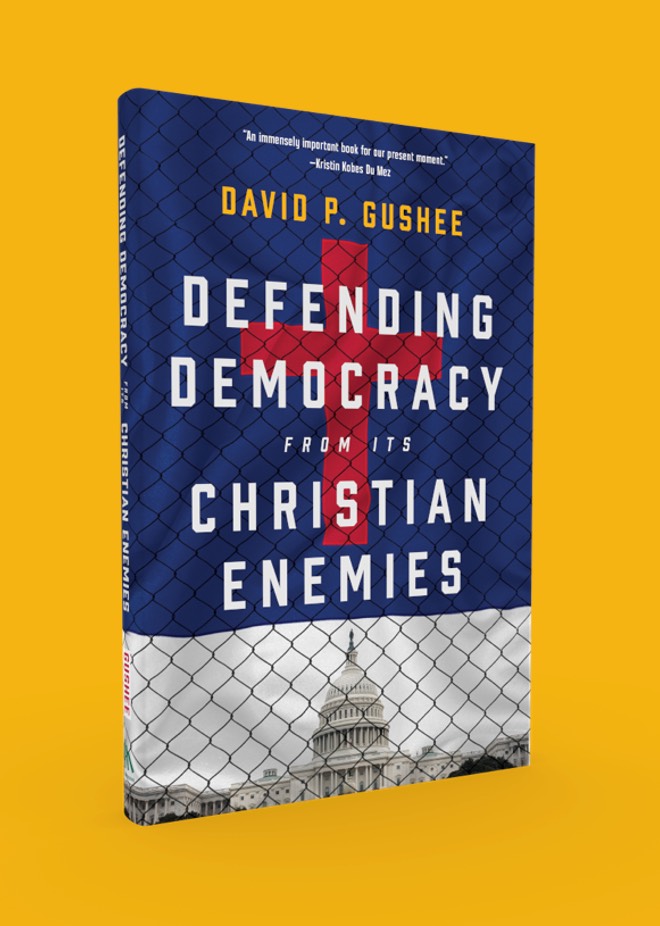Interfaith Insight - 2024
Permanent link for "When Politics and Religion Mix in Unhealthy Ways," by Douglas Kindschi, Founding Director of the Kaufman Interfaith Institute, GVSU on March 19, 2024
These are confusing times in the political world, both internationally and in our own country. Taking sides on geopolitical issues can often feed either Antisemitism or Islamophobia, or both. We have continued to address those issues here in West Michigan in ways that respect all persons’ religious understanding while also grieving the terrible killing of innocent civilians.
There are issues in our country as well as in parts of the world that show another danger when politics and religion interact in unhealthy ways. Last week Eerdmans Publishing and the Kaufman Interfaith Institute presented a program that exposed the danger of politics using religion in ways that are damaging to democracy and to sincere religious understanding.
Calvin University professor Kristin Kobes Du Mez, author of The New York Times bestselling book Jesus and John Wayne, interviewed David Gushee, author of the recent book, Defending Democracy from its Christian Enemies. Gushee writes that his book is one of Christian ethics, which offers a “vision for Christians in society that have democracy but are at risk of losing it.” He draws his vision from, in his words, “my reading of biblical prophetic tradition and the teachings of Jesus.” He also recognizes that this is not only a threat in America but also in other countries with different religious traditions.
Gushee begins his defense and analysis of democracy with a famous quote from the theologian Reinhold Niebuhr: “Man’s capacity for justice makes democracy possible, but man’s inclination to injustice make democracy necessary.” Democracy in its modern form was a reaction to centuries of monarchical absolutism and was expressed in the American and French revolutions of the 18th Century. It became marked by leaders being chosen by the people and civil rights and freedom being protected.
The world has experienced challenges to this democratic political system in the 20th Century, when it was perverted into autocratic rule by the right-wing movements in Italy under Mussolini and when the Nazis took power in Germany with Hitler. We are seeing beginnings of similar attempts in Turkey, Putin’s Russia, Poland, Orban’s Hungary, and Brazil. Gushee warns, “Unless there is a mechanism within a democracy for politicians demonstrating clear antidemocratic tendencies to be disqualified from standing for office, this vulnerability will always exist within democracy.”
Patriotism becomes “ultranationalism” when, Gushee warns, “the nation is identified with a particular ethnic, religious, or cultural group” that poses a threat to the interests and rights of other groups, as when Anti-Jewish ultranationalists in Nazi Germany identified Jews “as non-citizens, then as non-human, then as worthy of death.”
Looking more directly at the American scene, Gushee identifies a conservative coalition of Christians and nominal Christians whose rhetoric suggests “antisemitism, xenophobia, and patent racism, that is flat-out ethno-nationalism.” He clearly identifies the “special concern of this book is the role of Christians and Christianity in relation to all these negative trends.” He shows how Donald Trump’s “Make America Great Again” was for these followers a signal to restore white Christians to power in economic and cultural arenas, and a pushing back against societal trends “perceived as sinful or that unseated white Christians as the nation’s norm-setters in social change.”
In a section titled “Taking a Nation Back for God by Any Means Necessary,” Gushee summarizes the current political situation as follows: “Trump gained reactionary Christian support in large part because he sent every possible signal that he would wield his power relentlessly to achieve the religious counter-revolution that reactionary Christians have desired for so long."
Our nation has been served well by the democratic system, rule of law, and protection of rights for all citizens. Religious freedom has been protected and has not been seriously challenged for most of our history. When immigrants and people of minority religious identities are threatened, it is a dangerous development – especially when it comes from a perspective that even contemplates an attack on our Constitution.


